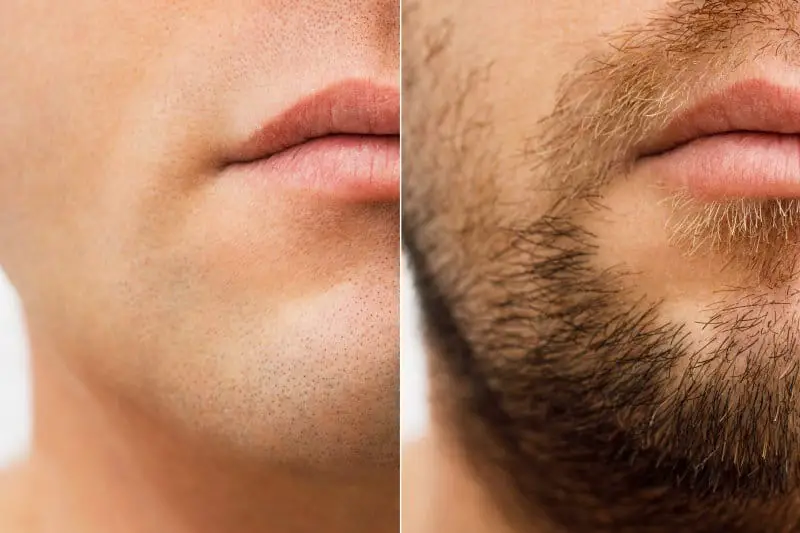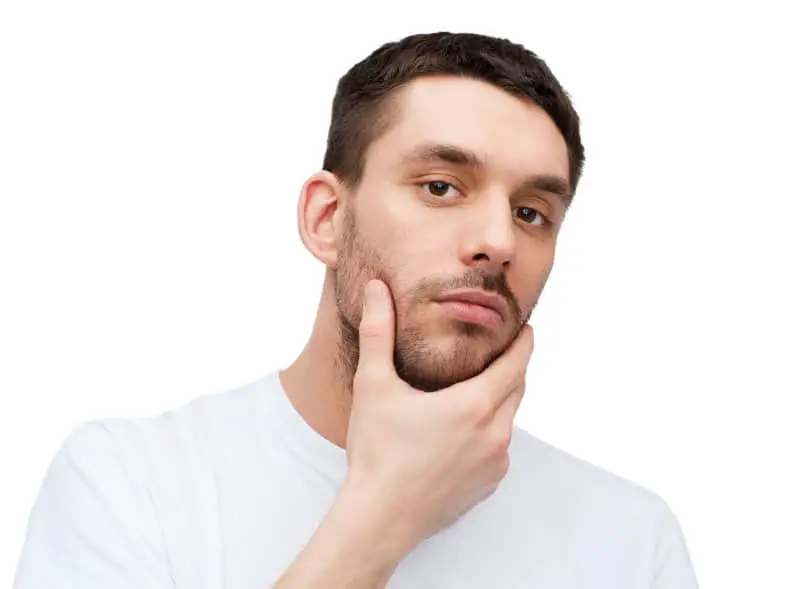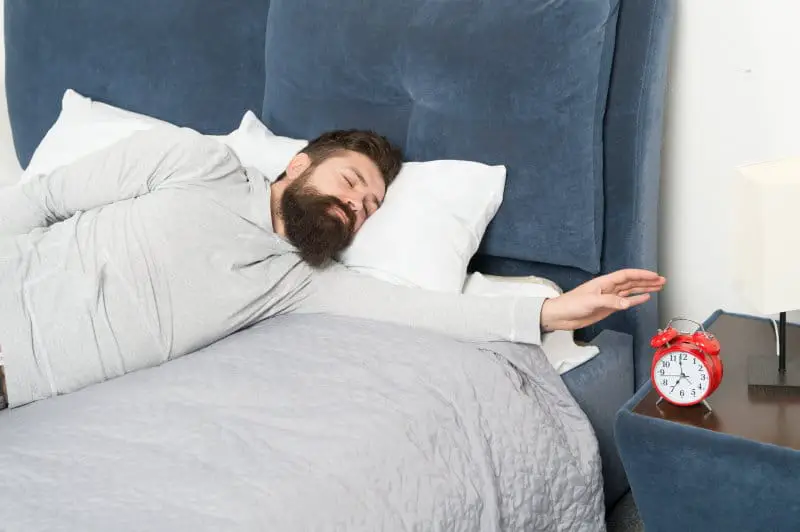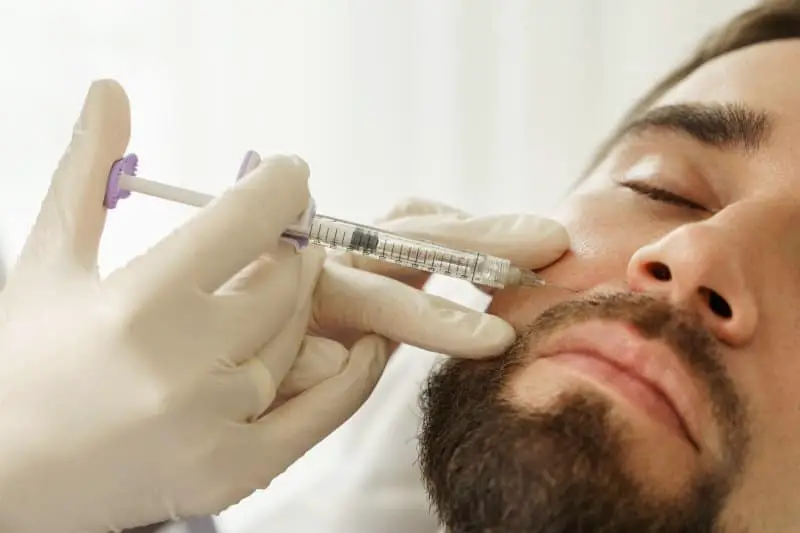Most men don’t want a patchy, thin, or slow-growing beard when they decide to grow out their beards. While looking for a solution to any of these issues, you might come across human growth hormone therapy, which can make you wonder, “Can growth hormone improve a beard?”
Growth hormone is a naturally occurring peptide hormone that stimulates growth, development, and regeneration. In recent years, it’s been the main ingredient in a treatment called HGH therapy, which is often used to restore hair loss. Growth hormone has been shown to improve beard growth.
In this article, we’re going to take a deep dive into what growth hormone is and whether it can improve beard growth or cause hair loss. We also provide you with tips on how to treat and prevent beard hair loss, so be sure to stick around!
What Is Growth Hormone?
Growth hormone (GH), also called somatotropin or human growth hormone (hGH or HGH), is a peptide hormone that spurs growth in children and adolescents.
It’s essential to help the body regulate metabolism, body composition, heart function, and muscle as well as bone growth.
Generally, HGH works in tandem with androgens, such as testosterone, to stimulate the growth of facial and body hair. In some cases, testosterone is even known to cause sudden beard growth.
The levels of HGH rise during childhood, peak during puberty, and then decline progressively from that point onward.
Even though low levels of HGH are normal in adults, serious HGH deficiency can have a negative impact on an individual’s health.
Symptoms of HGH deficiency include:
- Decreased muscle mass and strength
- Fatigue and low energy levels
- Weight gain
- Lower bone mineral density
- High cholesterol and other related heart problems
- High blood sugar
Will Growth Hormone Help To Improve Your Beard?

HGH or human growth hormone therapy is a treatment via injections that aims to elevate and restore growth hormone levels in an individual’s body. It may be one of the most effective methods of stimulating the growth of scalp hair, body, and facial hair.
Here’s how the procedure is usually done. Your surgeon will:
- Withdraw a blood sample from you
- Place the blood sample in a device called the centrifuge, which will separate the plasma from the red blood cells
- Inject the plasma, which contains the growth hormone, into the areas of your face and jaw where you want hair to grow
During the process, the plasma will degrade and release growth hormone, which in turn will trigger tissue rejuvenation and stimulate hair follicles.
Many people who have undergone HGH therapy have seen an increase in hair growth of up to 38%. Some patients have even reported that their hair is growing thicker and faster.
Another benefit of HGH therapy is that it can restore the metabolism of body cells and improve the production of other hormones and proteins.
As a result, you may notice improved energy levels, stronger stamina, and even faster muscle development.
That’s why HGH therapy isn’t used for cosmetic purposes only. Even an individual with a top-notch, full, and thick beard might need HGH therapy to alleviate high blood sugar, high cholesterol, and increased fat mass, among other symptoms.
HGH Supplements
If you’ve come across HGH therapy, you’ve probably heard of HGH supplements, which claim they can stimulate and boost an individual’s human growth hormone levels.
While it sounds promising and certainly preferable to injections, there isn’t enough evidence to suggest that these supplements work.
What’s more, neither the FDA nor the FTC has tested or verified the authenticity of these supplements. Both of these agencies, in fact, issued warnings against the use of such products.
Can Growth Hormone Cause Hair Loss?

Currently, there’s no evidence that having high growth hormone levels can cause hair loss. Insulin Growth Factor 1 (IGF-1) is the primary HGH responsible for stimulating hair follicle growth and lowering the risk of follicle cell death.
On the other hand, having low growth hormone levels can raise DHT levels, which can lead to overall hair loss. There’s even a study that reveals that there’s a link between low HGH and hair loss.
Low levels of HGH, combined with other hormonal imbalances, can induce 5-α reductase activity and elevate DHT levels, which are common hair loss causes.
In another study, HGH therapy reduced DHT levels and inhibited 5-α reductase activity, resulting in increased hair growth.
It’s worth noting that, when out of balance, both 5-α reductase activity and DHT are simultaneously responsible for excessive body hair and hair loss in both men and women.
How to Treat and Prevent Beard Hair Loss

While there’s little evidence that there’s a one-size-fits-all solution for beard growth, many experts recommend dietary and lifestyle changes that can boost your growth hormones.
Sleep
Maintaining a consistent sleeping routine of at least seven hours is essential to your overall development.
During sleep, your body releases the majority of its HGH in pulses, with the largest pulses occurring before midnight and some smaller pulses occurring in the early morning.
If you sleep late or don’t sleep enough, the growth hormone gets suppressed, which can have a negative impact on your health and growth.
In fact, studies have shown that sleep deprivation has been linked to hormonal disruptions, specifically the release of growth hormones. As you and I know, low growth hormone levels can lead to hair loss, so make sure you’re getting enough sleep at night.
Diet
There’s no special diet that’s proven to improve beards. Nonetheless, eating a well-balanced, nutritious, and healthy diet can help your bodily functions perform at their peak.
When your body gets all the nutrients it needs, your beard hair will grow normally.
Grooming
Trimming and grooming can nourish and strengthen your beard. Even better, maintaining a grooming routine can promote and speed up healthy beard growth.
While there’s no hard and fast rule, you should aim to trim your beard once per week. Cut any stray, frail ends to allow your beard to grow healthily.
You can also replenish your beard and the skin beneath it with carrier oils like sweet almond oil and jojoba oil to make it thick and healthy.
Time
Most importantly, keep in mind that patience is key when it comes to beard growth. Because genetics play a significant role in beard growth rate, it can take either a short or long time for your beard to go from stubble to a full, thick beard.
In addition, some men’s beards may not reach their full potential until the age of 30. So, if you’re under 30, and you have yet to grow a full-on beard, don’t give up!
Final Thoughts
Can growth hormone improve a beard?
It’s a fair question to ask because growth hormone therapy isn’t the kind of treatment most men would think of when they’re looking for ways to improve their beards.
Luckily, HGH therapy is a relatively safe procedure that has positive results on beard growth. It can also improve the elasticity of your skin, reduce wrinkles, and even promote nail growth.
Certain vitamin deficiencies can also have an effect on your beard. Read on here to find out which vitamins you should include in your diet, either through supplements or through food.

